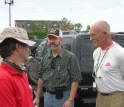|

Press Release 05-190
Researchers to Present Findings on New Orleans Levee Breaches

Details of preliminary results to be released
November 1, 2005
On Wed., Nov. 2, a multi-institution research team led by geotechnical engineer Raymond Seed of the University of California (UC), Berkeley, will release preliminary findings from a study of the New Orleans levee system.
Seed and his colleagues have been compiling physical evidence and observations to understand the levee breaches following Hurricane Katrina, the subsequent repairs and the implications of the findings for future storm-management efforts across the country.
The New Orleans levee systems and the dangers they face are not unique; similar systems, and risks, exist in Calif.'s freshwater levee system, the Mississippi and Ohio River basins and elsewhere in the United States.
Part of a national response by federal research agencies to learn from the hurricane disasters, the UC Berkeley-led investigation is one of 32 rapid-response projects supported by the National Science Foundation (NSF) Directorate for Engineering to study the impacts of Katrina before evidence is lost to erosion, rebuilding or decay.
Like many rapid-response grants, funding for the levee research supports such costs as travel, equipment and logistics to enable the research team to collect perishable data. The grants do not fund data analysis.
NSF expects to make as many as 51 Katrina-related awards totaling $5 million in the coming months, with support coming from the Directorate for Engineering, the Human and Social Dynamics program, and the Directorate for Geosciences.
The NSF projects are all funded with Small Grants for Exploratory Research (SGER) awards, a special discretionary category for funding exploratory, high-risk research often associated with natural disasters, but which can fall within any of NSF's research areas.
NSF has used SGER grants to support researchers studying the Sept. 11, 2001, terrorist attacks, the 2004 Indian Ocean tsunami, and numerous other disasters, often through grants to partnering institutions such as the Earthquake Engineering Research Institute (EERI) and the Natural Hazards Center (NHC).
-NSF-

Media Contacts
Joshua A. Chamot, NSF (703) 292-7730 jchamot@nsf.gov
Sarah Yang, University of California, Berkeley (510) 643-7741 scyang@berkeley.edu
Program Contacts
Richard J. Fragaszy, NSF (703) 292-8360 rfragasz@nsf.gov
Related Websites
University of California, Berkeley, News Release: http://www.berkeley.edu/news/media/releases/2005/11/02_levee.shtml

The National Science Foundation (NSF) is an independent federal agency that
supports fundamental research and education across all fields of science and
engineering, with an annual budget of $6.06 billion. NSF funds reach all 50
states through grants to over 1,900 universities and institutions. Each year,
NSF receives about 45,000 competitive requests for funding, and makes over
11,500 new funding awards. NSF also awards over $400 million in
professional and service contracts yearly.
 Get News Updates by Email Get News Updates by Email
Useful NSF Web Sites:
NSF Home Page: http://www.nsf.gov
NSF News: http://www.nsf.gov/news/
For the News Media: http://www.nsf.gov/news/newsroom.jsp
Science and Engineering Statistics: http://www.nsf.gov/statistics/
Awards Searches: http://www.nsf.gov/awardsearch/
| 



